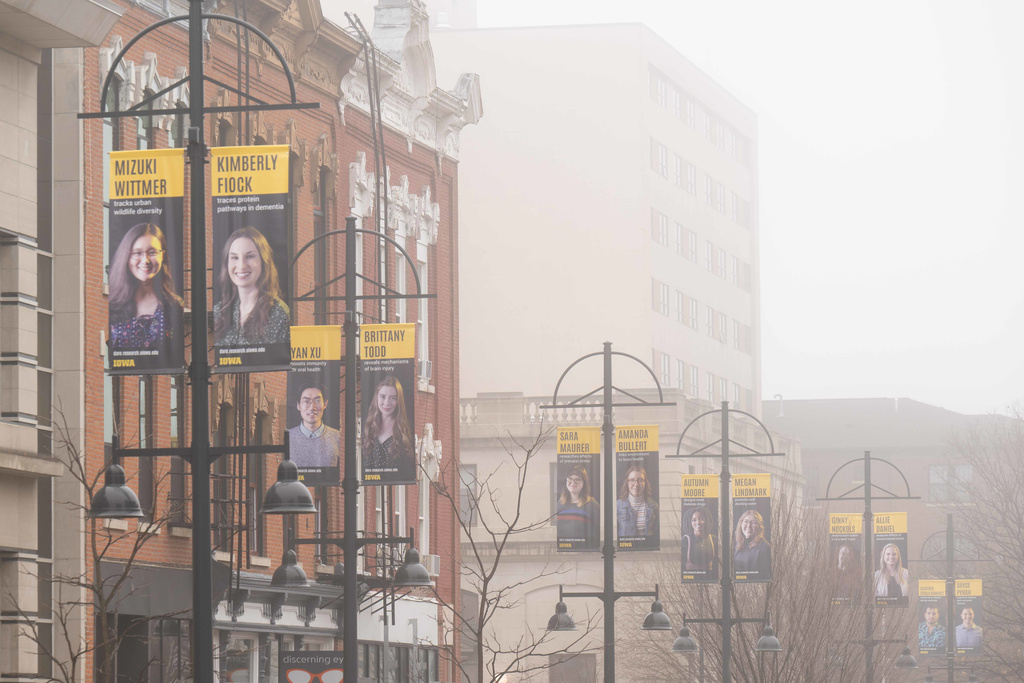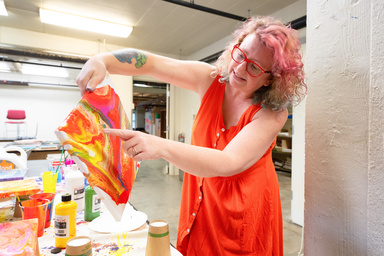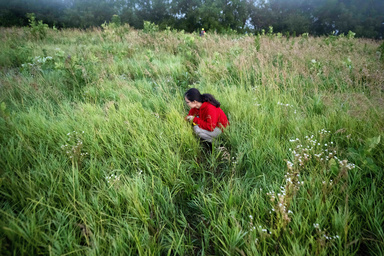
As students grab coffee on the way to class and as Iowa Citians commute to work, they may run into familiar faces on—or above—the sidewalks. Banners in downtown Iowa City are highlighting the work of 70 University of Iowa undergraduates, graduate students, and postdoctoral researchers and scholars.
The banners, the eighth installment of the Dare to Discover campaign, will be on display through mid-March.
“Every day, these students and scholars pursue research and creative activities that not only prepare them for their future careers but also aim to improve the future for all of us,” said Marty Scholtz, vice president for research. “They have applied their knowledge and skills to achieve great things in the classroom and beyond.”
"The students and postdocs, who examine everything from altruism throughout a career to the role of zoos in American culture, were selected from more than 200 nominations made by faculty mentors and colleagues. Profiles of each member of the 2023 banner cohort are available at dare.research.uiowa.edu and will be shared on social media using #DiscoverUI.
As in recent years, many students continue to conduct research related to COVID-19 and its ongoing impacts in every arena of life. Stephanie Evett, a master’s student in the College of Public Health, tackles COVID-19 vaccine hesitancy in Iowa micropolitan communities as a research assistant in the Prevention Research Center for Rural Health. “It’s critical that we understand why populations are not getting vaccinated so we can intervene to encourage vaccination among these populations,” Evett said. “This in turn will promote COVID-19 vaccinations, inching us closer to achieving herd immunity.”
Kaelen Novak, an MFA student in theatre arts, has repurposed a fast-fashion software application to craft costumes tailored an actor’s body, which can either be donned by a motion-capture avatar for virtual productions or printed and sewn for wear on the stage. “COVID-19 started a revolution in what it takes for something to be a theatrical experience through things like Zoom theatre, audio dramas, and outdoor interactive performances,” Novak said. “My research allows incredibly lifelike theatrical productions to occur fully virtually with actors from all over the world working together, but also maximizes that creation process in a costume shop by allowing incredibly complex and unique costumes to be produced for an actor without ever needing to waste materials or fitting time to make the perfect garment function with a minimal team.”

Bree Neyland, an undergraduate studying art education, is designing a curriculum to teach problem-solving skills to students in post-secondary special education programs such as UI REACH by focusing on applying translatable skills in art class. “Research has helped me see how all the parts of my scholarship fit together so that it can be easily adapted to suit the needs of different audiences,” Neyland said.
Maria Leonor Márquez Ponce, a first-generation PhD student in the Department of Spanish and Portuguese, studies testimonios of Chicano/a and Latinx/a/o students in higher education. As a Humanities for Public Good intern, Márquez Ponce worked with the UI Libraries and Special Collections to collect and record oral histories of students, alumni, faculty, and staff affiliated with the Latino Native American Cultural Center. “My research has been a reminder of why obtaining an education is so important for me,” she said, “It has made me more aware of the struggles that first-generation students face in higher education.”

Mizuki Wittmer, an undergraduate student studying environmental science and Spanish, is tracking wildlife diversity across urbanized areas to examine how predator-prey relationships among small mammals shift in the increasing presence of humans. Understanding this connection could help support the design and management of biodiversity-rich and wildlife inclusive cities. “Being involved in research has allowed me to gain valuable experiences to better prepare me for my future career after I graduate,” Wittmer said. “It has improved my critical thinking skills and helped me apply concepts I learned in the classroom to real world situations.”